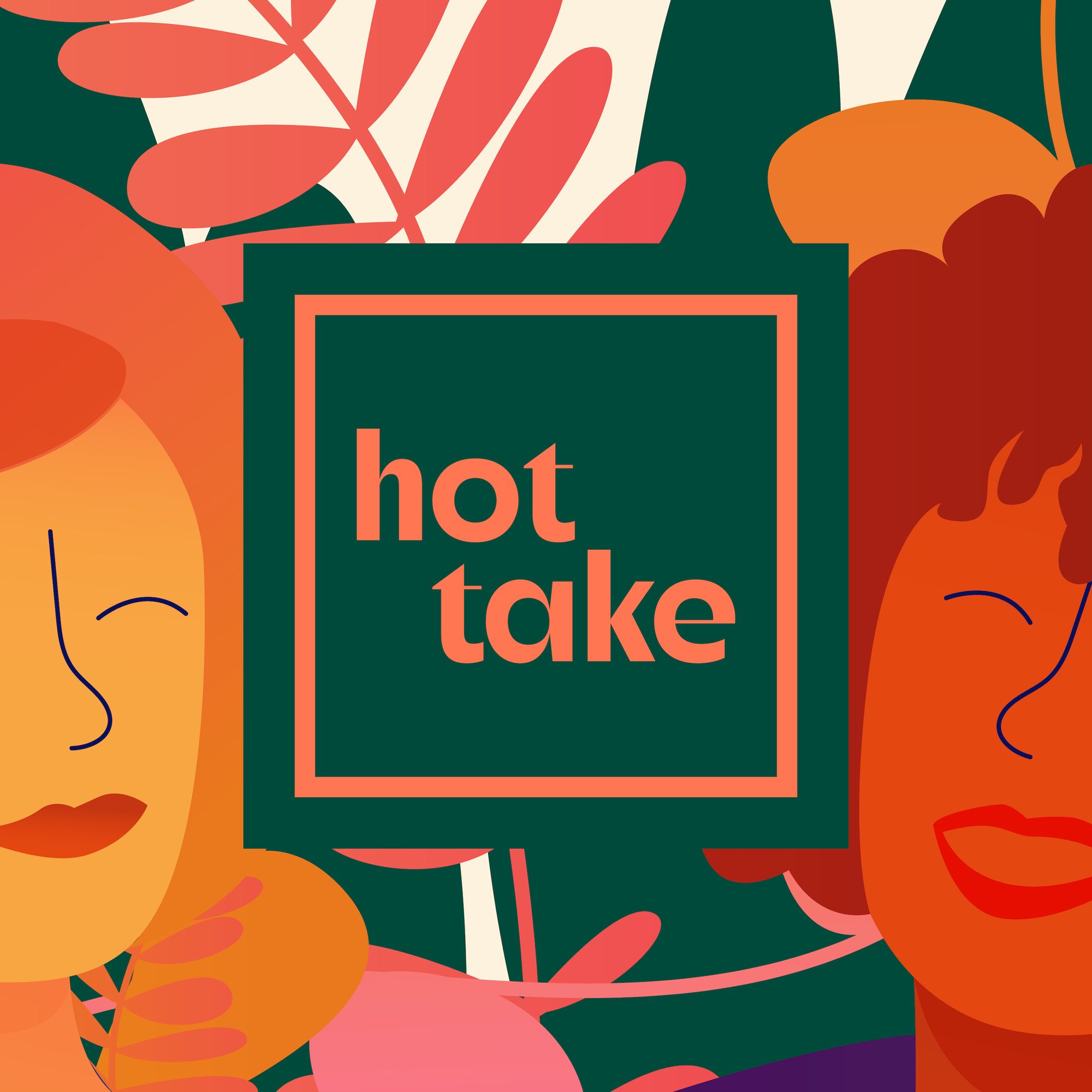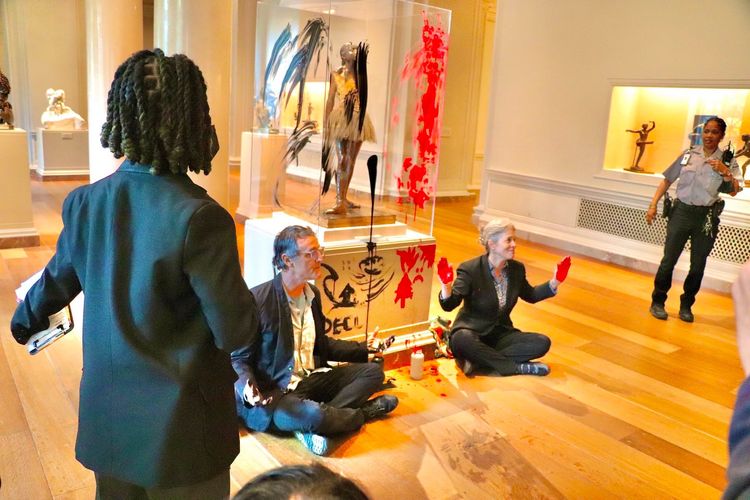Looking at Don't Look Up
Hey Hot Cakes,
We're back! Thanks for bearing with us as we dealt with a bit of burnout. Glad we took that break too because 2022 is already coming in hot. We hope all of you got to take an end-of-the-year rest, too. We're ready to get back at it, and will even have podcast news for you soon. In the meantime, hope you enjoy this week's newsletter. Since it's been a few weeks, we're making the full newsletter free for all this week, as a thank you for being part of our community (you can upgrade to a full subscription, paid monthly or yearly, to get the whole thing every week).
Happy New Year. We're excited to be back in your inbox every Sunday again!
Mary + Amy
Looking at Don’t Look Up
By Mary Annaïse Heglar
Unless you’ve been hiding under an, um, asteroid—or out here having a life off of the internet machine (in which case, go you!)—you’ve heard about the latest Netflix blockbuster, Don’t Look Up. And if you’re reading this newsletter then you know that, gasp, it’s a climate movie! A high-production, A-list studded climate movie. On the biggest streaming platform in the world. It’s huge.
A lot has been said about this movie. So much that I will not sit here and pretend to have heard or read all of it. (Been trying to unplug a bit more lately.) Personally, I didn’t love or hate the movie, my feelings are more complicated than that, and they are too many and varied to get into in one newsletter piece or, heaven forbid, a tweet. I’ll probably talk about it more, write about it more, watch it again, change my mind, and start all over again. As a climate media junkie, I am fascinated by it and all the fanfare around it, but for now I want to focus on three main ways I think Don’t Look Up has changed the portrayal of climate change in Hollywood:
- It uses humor. Not gonna lie, I didn’t laugh a lot, aside from a couple of chuckles from Jonah Hill. I think that’s mostly because I’ve been so steeped in climate work for so long, the jokes were stale to me—and I’ve been the butt of too many of them by now. But, I still appreciate the usage of humor and the attempt to add some levity to the extremely absurd story of climate change.
- It rejects the happy ending. Unlike so many existential disaster movies of yore, mankind does not band together to avert the Big Bad. Shit hits the fan. Time runs out. We’ve yet to see if it scares people into action—I think it’s likely it may have shocked people into the beginnings of a climate grief cycle, and we’ll have to “sit tight and assess” until they come to the “rage” stage—but I’m glad it tried something different.
- Misinformation takes center stage. One of the big ways that Don’t Look Up fails as a metaphor for climate change is that the comet is a pure coincidence. It wasn’t created on earth as a product of capitalism and colonialism. So, that means the movie is freed of the task of creating and vilifying a counterpart to the fossil fuel industry, and that gave them room to place the blame at another just-as-guilty party: the media that under-informs the public and the politicians that actively misinform them. We need so, so many more people to understand that.
I’ll end with three more things: I recommend watching it, I appreciate the fact that it was made, we need more climate movies.
Climate Crisis, Meet Democracy Crisis
By Amy Westervelt
Max Berger is a longtime progressive organizer who worked with grassroots organizing group Momentum to incubate and launch the Sunrise Movement. Today, he works for More Perfect Union, an advocacy group that helps working people to be seen and heard in media coverage. Before all that, Berger was involved with Occupy Wall Street and If Not Now, a Jewish American movement against the occupation of Palestine. He's also worked in politics for years, moving between grassroots organizing and Capitol Hill (he's worked on multiple campaigns, most recently Elizabeth Warren's presidential bid) in a way that makes him uniquely suited to think through the intersection between the climate crisis and the democracy crisis. So I sat down with him last month for an interview for Scene on Radio. Here’s some of the stuff that didn’t make it into the episode but is still rattling around in my brain:
Amy: I've seen you at least tweeting a few things recently that it might not be possible to just improve the system that we have, that there might actually be a need for what some would call revolution. And I'd love to hear you expand on that.
Max: In the same way that 18 months out, Sunrise was kind of like, “yeah, we want to start a new movement that's not just about ending the fossil fuel industry, but that has a sort of positive vision of what we're trying to fight for. And we want it to be big and we want it to be political and not just the social movement, but we don't really know what it is yet.” I'm sort of in that kind of a place with this conversation.
So with that caveat, I would say, well first let's define the problem, right? Because I think my sense of where this is going, is that it's not really so much a question of should we keep the current system that we have, or should we throw it aside and get a totally new system—unfortunately I think this decision has somewhat already been made for us. If you step back and look at the U.S. as a country, it's very clear the current constitutional arrangement is not long for this world.
You know, you have a significant subset of the population, particularly the white population, really terrified about the transition away from a white majority population to a multi-racial majority and that's happening in the context of world-historic inequality. So you really do have the conditions for ethno-nationalist, authoritarian politics. Call it fascist, call it ethno-nationalist, authoritarian, call it white supremacist—a politics in which there is a significant number of people that are willing to use violence and do not really subscribe to the beliefs that are required for participating in a democracy because they're afraid of losing power within that democracy to other ethnic groups. And if you take that, as a kind of skeleton key for what's going on, a lot becomes more clear. That white supremacist plurality is not big enough to govern the country, but it is big enough to take over the Republican party. And through that, they are able to take control of state and federal governments because we have a very anti-democratic political system.
Amy: Right, starting with the fact that the popular vote doesn't guarantee victory.
Max: Right. Our political system is a result of a compromise with slaveholders. And so it vastly over-represents small rural states where white people have more power. So that white supremacist plurality can take over the federal government and state governments with a minority of votes. And the Senate, as we're seeing now, the Electoral College… I mean we are threatened with the potential every four years that there's going to be another instance in which the winner of the popular vote does not become president. And, you know, that has happened recently a number of times. So all of that, and the two-party system, allows 25 to 40 percent of the population to govern. Which means we're not going to see the multi-racial majority have an opportunity to turn its will into law in the next 10 to 15 years. And I think the amount of tension that will generate will break the political system. Particularly when the people in power are taking active steps to move us away from competitive elections and limit people's rights. I cannot imagine a situation in which the multiracial majority takes that lying down. And I also don't think that the white nationalists are going to become less aggressive in their opposition to a multiracial democracy. Our political system is basically designed as poorly as possible to manage the kind of demographic transition we're seeing because the two-party system collapses all divisions in society into a zero sum, all or nothing, competitive existential conflict.
Amy: And then you've got the climate crisis resulting from and overlaid on top of all that.
Max: Right, it can become dangerous very quickly. And in addition, with the separately elected presidency and a bicameral system, we have what political scientists refer to as a profusion of veto points. So it's very, very difficult for bills to become law as we see with everything—gun control, climate change, all of it. I mean with gun control, every time there's a massacre people always ask if gun control has an 85 percent approval rating, why can't it pass? And the truth of the matter is that very little can pass. There's a stat that the United States is the only system that has a separately elected executive branch that has not at some point collapsed into dictatorship.
Because in presidential systems with a separately elected executive, what always happens is there's a conflict between the President and the Congress. And there's some external crisis that requires action and their Congress isn't capable of or willing to respond.
Amy: Like what's happening with climate right now. And Covid. And a whole bunch of crises all at once.
Max: Exactly, and in those situations, what's happened in other countries with this sort of system is that the executive takes the authority to do what it wants, without the approval of the legislature. And once that is broken, it's very hard to take back. And I think some version of that is more or less inevitable In the next five years. So the way I see it, look we're going to get a new political system. The question is, does it happen before authoritarianism and civil war or after?
Digest
Your weekly roundup of climate coverage.
Rising Temperatures, Rising Tides
Ghost Flights Are Polluting the Skies Thanks to Omicron, by Isaac Schultz for Earther
Tracking Climate Change in 193 Countries, by Sarah Bahr for The New York Times
Health Risks of Smoke and Ozone Rise in the West as Wildfires Worsen, by Henry Fountain for The New York Times
80% of Americans Suffered Through Extreme Heat Last Year, by Molly Taft for Earther
There Was Way Too Much Lightning in the Arctic Last Year, by Brian Kahn for Earther
Here's How Climate Change and Covid Are Transforming Skiing, by Lauren Jackson for The New York Times
Have Wildfires Ruined California's Magic? By Elizabeth Weil for The New York Times
Winter without snow is coming, scientists warn | Grist by Sarah Sax for Grist
The Climate Presidency?
Why the Coming Months Will Be Critical for Biden's Climate Plan, by Lisa Friedman for the New York Times
We'll Believe It When We See It, Joe, by Brian Kahn for Earther
Biden 'Over-Promised and Under-Delivered' on Climate. Now, Trouble Looms in 2022, by Lisa Friedman for The New York Times
No Time to Waste in 2022, by Yessenia Funes for Atmos
Biden Consoles Residents in Fire-Ravaged Colorado, by Zolan Kanno-Youngs for The New York Times
Joe Biden's 2021 Climate Report Card, by Brian Kahn and Molly Taft for Earther
What the Stalled Build Back Better Bill Means for Climate, in One Chart, by Brad Plumer and Nadja Popovich for The New York Times
January 6 Shows the Democracy Emergency Is a Climate Emergency, by Mark Hertsgaard for Earther
The Conservative Plot Against Green Investment, by Kate Aronoff for The New Republic
Virginia Democrats Aim to Block Trump's EPA Chief From State Agency, by Lisa Friedman for The New York Times
Is the US uniquely bad at tackling climate change? | Grist by Shannon Osaka for Grist
Climate Accountability
French Car Ads Will Soon Be Required by Law to Tell You Not to Drive a Car, by Lucas Ropek for Earther
Don't Make Meat Cheaper. Make It Much More Expensive, by Jan Dutkiewics and Gabriel N. Rosenberg for The New Republic
This Year Disappointed on Climate. Fierce Accountability Journalism Can Help Save 2022, by Andrew McCormick for The Nation
Mining of Lithium, Key to the Climate Fight, Faces New Scrutiny in Chile, by John Bartlett for The New York Times
An Illustrated guide to 2021's pipeline projects and battles | Grist by Alexandria Herr for Grist
Justice Is Justice Is Justice
Extreme Heat Is Making US-Mexico Border Crossings Even More Dangerous, by Molly Taft for Earther
There Was No Union. There Was No Plan, by Janice Fine for The Nation
We Need to Talk About Climate Change and Suicide, by Eleanor Cummins for The New Republic
Ten humanitarian crises and trends to watch in 2022, by The New Humanitarian Staff
Clean energy goes up against tribal rights and biodiversity in Nevada | Grist by Emily Pontecorvo for Grist
More than 40 percent of Americans live in counties hit by climate disasters in 2021 - The Washington Post by Sara Kaplan for The Washington Post
Glimmers of Hope
What Gives Climate Researchers Hope? By Diyora Shadijanova for Vice
Building Unity Through GoGrowWithLove, by dayax raage for Atmos
Fusion power is a reason to be excited about the future of clean energy, by Umair Irfan for Vox
This Vast Wildfire Lab Is Helping Foresters Prepare for a Hotter Planet, by Henry Fountain for The New York Times
Coming Soon to This Coal County: Solar, in a Big Way, by Cara Buckley for The New York Times
Beyond reusing and recycling: How the US could actually reduce plastic production | Grist by Joseph Winters for Grirst
Climate in Culture
Boaty McBoatface Expedition Underway to Thwaites Glacier, by Brian Kahn for Earther
What the 'Don't Look Up' Action Campaign Gets So Wrong, by Molly Taft for Earther
Manchin-Connected Coal Plant Tries to Pivot to Crypto, Fails, by Molly Taft for Earther
Decarbonizing the Art World, by Jennifer Hahn for Atmos
How Climate Infiltrated Pop Culture in 2021, by Daphne Chouliaraki Milner for Atmos
“Don't Look Up” Was Good for Climate Cinema, Even If You Hated It, by Eleanor Cummins for The New Republic
3 ways remote work could remake America, by Jerusalem Demsas for Vox
An Evangelical Climate Scientist Wonders What Went Wrong, by David Marchese for The New York Times
Don't Look Up: four climate experts on the polarising disaster film by Ketan Joshi, Fiona Harvey, Nina Lakhani and Damian Carrington for the Guardian
Plus More
A New Year's Wish for Peace, by Sandra Ramirez Acuna for Atmos
Climate Change Is Affecting Champagne Now, Too, by Roberta Abate for Vice
The Best of Atmos in 2021, by Yessenia Funes for Atmos
The great population growth slowdown, by Bryan Walsh for Vox
Finding a Story by Asking 'Really Dumb Questions,’ by Katie Van Syckle for The New York Times
Road Salt Works. But It's Also Bad for the Environment, by Jenny Gross for The New York Times
The Ghost Wolves of Galveston Island, by Emily Anthes with photos by Tristan Spinski for The New York Times





Only paid subscribers can comment.
Please subscribe or sign in to join the conversation.